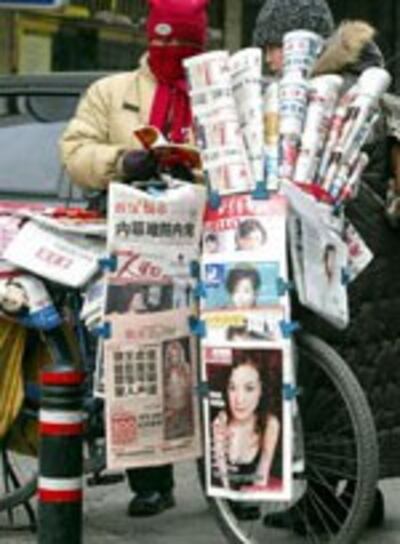
HONG KONG—Chinese authorities have closed a key supplement linked to one of the country's most influential newspapers after an explosive dispute between the paper's top editors and Communist Party officials over journalistic values.
The long-running conflict between editorial staff at the China Youth Daily and the paper's ruling body, the Chinese Communist Party Youth League, escalated Tuesday with the scrapping of the paper's popular Freezing Point supplement by administrative decree.
Freezing Point's founding editor and chief editor, Li Datong, confirmed the news to RFA's Mandarin service. "I can't tell you any details," Li said. "All I can do is to confirm that this story is true."
"Because we have no say in this matter, there will be no issue of Freezing Point tomorrow. There's nothing we can do about it," said Li, who said it would be "inconvenient" to give reasons for the decision.
Freezing Point made its debut in January 1995. By the end of that year, readers had voted it their favorite supplement.
I heard that the supplement was closing for rectification. But I don't know any of the details. I heard that the Party Central Propaganda Department would run a column in the paper, but I haven't seen it.
Analysts say the move highlights a fresh initiative by President Hu Jintao and Premier Wen Jiabao's government to tighten state control over China's media.
Simmering dispute
The dispute at the paper has been simmering for the last two years but blew up in mid-2005 after Li wrote an angry internal memo criticizing a reward system linking journalists' salaries to the good opinion of top government officials.
The memo was leaked to www.observechina.com. It followed the resignation of a top journalist, Li Fang, and a diatribe against a top Youth League official by senior editor Lu Yuegang the previous year.
Lu, who is currently out of Beijing on a business trip, said he had heard a rumor that Freezing Point had been closed, but that he had received no formal notification from his employers.
"I heard that the supplement was closing for rectification. But I don't know any of the details. I heard that the Party Central Propaganda Department would run a column in the paper, but I haven't seen it," Lu told RFA.
"We will know the reasons if and when we get a formal notification. Then we will respond to it," he said. "I don't know about anyone else, but I will definitely respond to this...Exactly how is hard to say right now—it will depend on how things unfold."
Beijing-based independent commentator Liu Xiaobo said the authorities had had Freezing Point in their sights ever since the open letter last year.
"These top-quality journalists at Freezing Point have already had many run-ins with the editor-in-chief, Li Erliang. Usually because they have had many stories spiked at the last minute by him," Liu said.
He cited an in-depth investigation into a plagiarism scandal surrounding a professor at the University of Wuhan in central China. "Perhaps that story was a major factor in the closure of Freezing Point."
Wide readership
Liu said the move was the latest in a series by the Hu and Wen leadership targeting the media. But he said the crackdown would undermine government aims to increase competition among and decrease state subsidies to Chinese media.
Established in 1951, the China Youth Daily has always drawn a wide readership, owing to compulsory subscriptions taken out by China's schools and colleges.
Published nationwide, it has widened its reach to take in ordinary citizens. It is a highly respected publication, reporting daily sales figures of around 500,000 copies.
Original reporting in Mandarin by Ke Hua. RFA Mandarin service director: Jennifer Chou. Translated and written by Luisetta Mudie. Edited by Sarah Jackson-Han.
